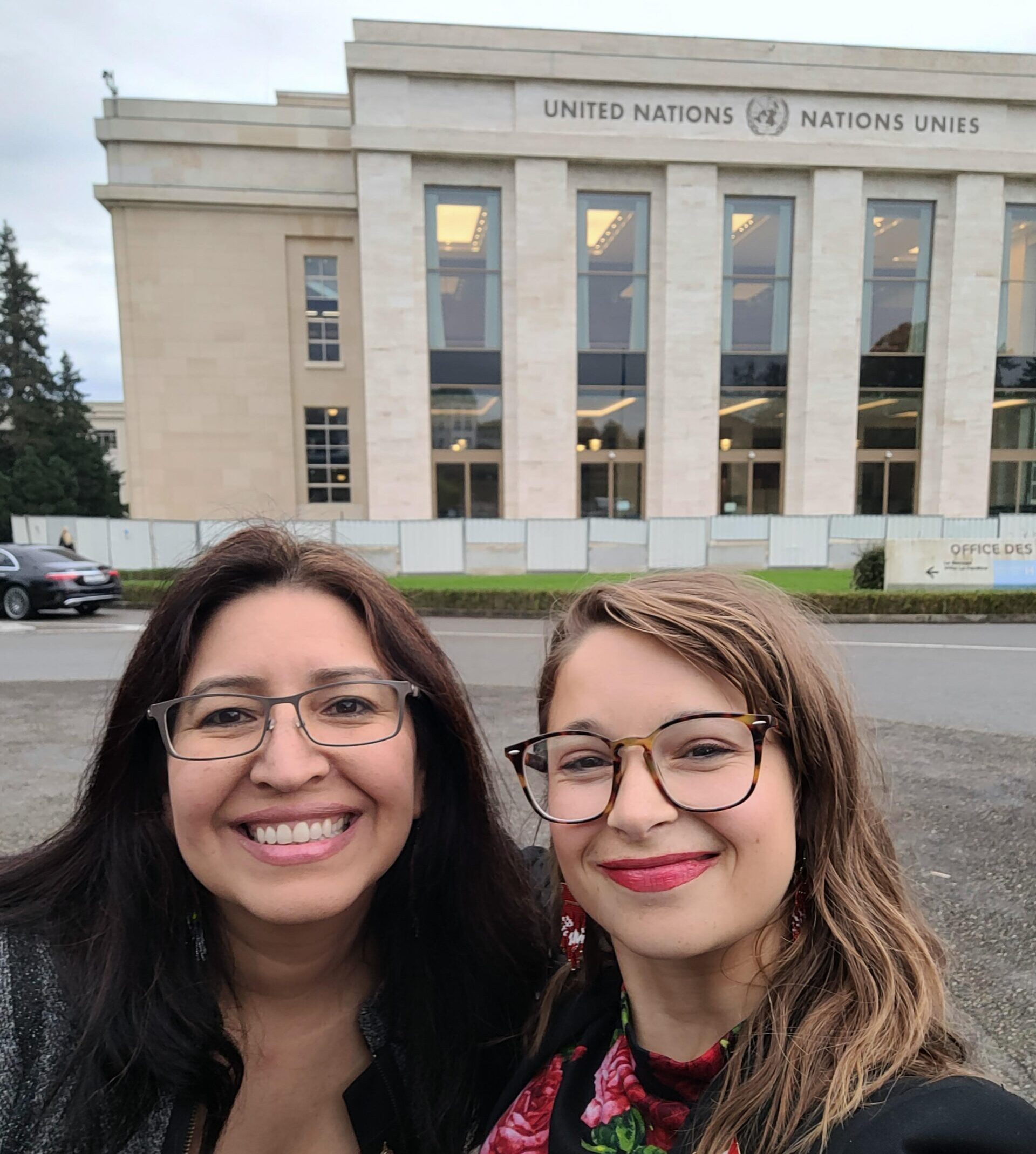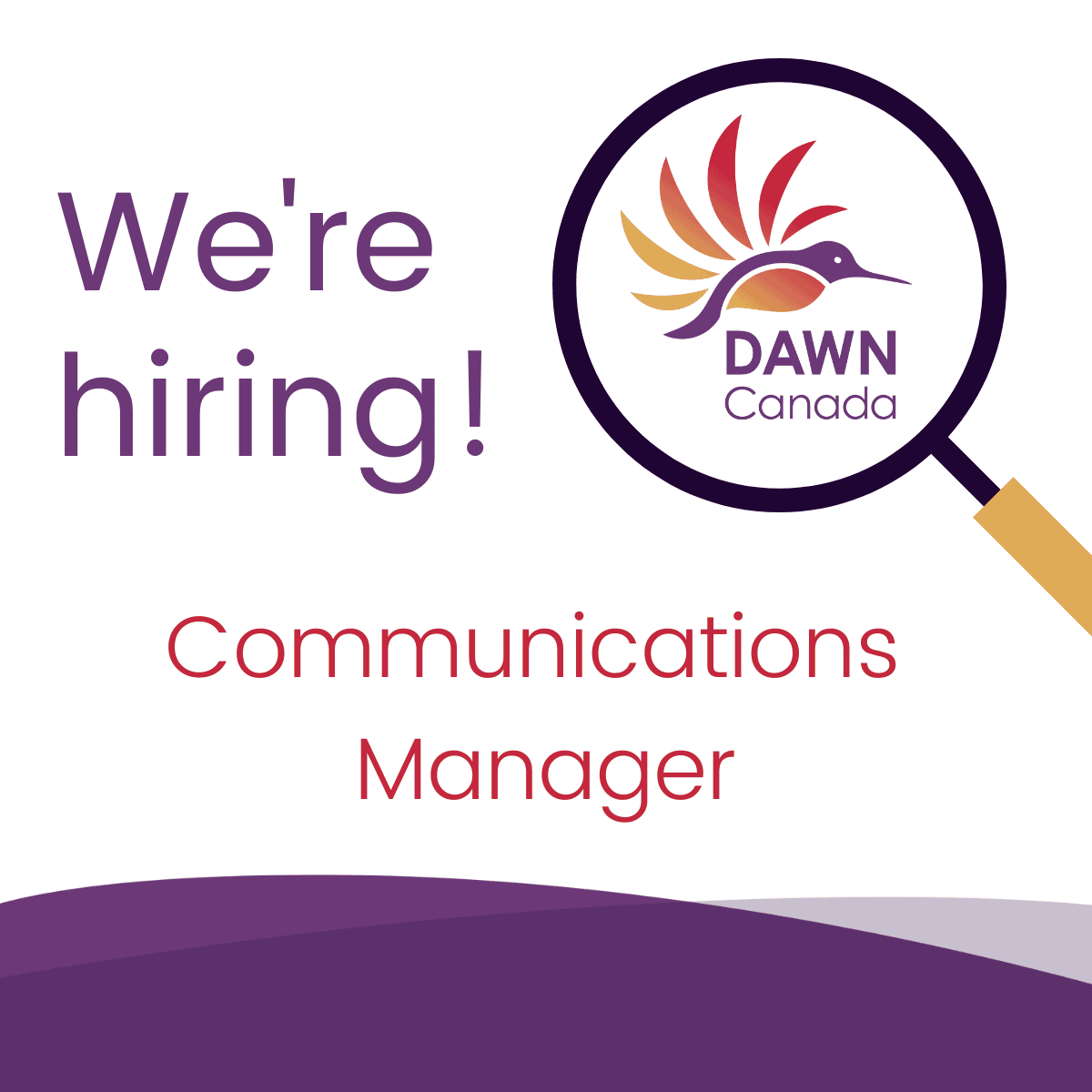
January 28, 2025
DAWN Canada attended the 89th session of the Committee of the Elimination of Discrimination Against Women (CEDAW) to represent women, girls and gender-diverse people with disabilities and present our submission.
Adopted by the United Nations in 1979, the Convention of the Elimination of Discrimination Against Women is the most important human rights treaty for women’s rights. The CEDAW committee is comprised of 23 independent experts on women’s rights that monitors the implementation of the Convention of the Elimination of Discrimination against Women.
Our Submission: Key Human Rights Priorities for Women, Girls and Gender-Diverse People with Disabilities
Our submission to the committee highlighted key priority issues for women, girls and gender-diverse people with disabilities in Canada, who represent nearly 1 in 3 women in Canada. Issues such as Gender-Based Violence, over-incarceration, and Medical Assistance in Dying are some of our key issues.
Our submission outlines:
- 30% of all women in Canada live with a disability. These rates are higher for Indigenous, Black and other racialized women and gender-diverse people with disabilities in Canada.
- Women, girls and gender-diverse people with disabilities are disproportionately affected by gender-based violence and gender-based violence is a leading cause of disability for women in Canada, especially for Indigenous and Black women.
- Facing systemic oppression that is often exacerbated by intersecting identities, women and gender-diverse people with disabilities are most vulnerable to opt for Medical Assistance in Dying due to unmet needs in terms of disability support.
- The treatment of incarcerated Indigenous women with disabilities in Canada is a significant concern as they are disproportionately represented in carceral institutions and face higher rates of victimization.
- Indigenous women, girls and gender-diverse persons living with a disability face significant barriers to healthcare and life expectancy for First Nations people is decreasing.
Our submission recommends:
- Reliable and adequate funding for culturally specific services and healthcare for Indigenous women with disabilities in First Nations communities, on and off reserve.
- The need for desegregated data to inform policy responses that meet the needs of the most underserved in Canada.
- A government halt to any further expansions to Medical Assistance in Dying (MAID) without extensive ethical review that considers gender-based violence and the linkages with Medical Assistance in Dying (MAiD) specific to the pressures applied through societal barriers and systemic pressures, as well as unique challenges faced by women with disabilities to ensure that MAiD is a truly autonomous choice, free from coercion or desperation.
Attending the 89th Session of UNCEDAW
Attending the 89th CEDAW session was an opportunity for DAWN to advocate on the most pressing issues for women, girls and gender-diverse people with disabilities, including those who are Deaf, in Canada. While Canada undergoes a state review to examine how the country is fulfilling their obligations to CEDAW, NGOs had the opportunity to provide their feedback, data and recommendations to committee members on what we see as the leading human rights issues for women, girls and gender-diverse people in Canada.
On the first day, Canada presented a public statement on behalf of NGOs identifying our priority issues. Canadian NGOs made 42 submissions to the CEDAW, a significant increase from previous CEDAW sessions. This 14-minute statement was a collaborative effort to summarize the broad scope of pressing issues related to human rights from women, girls and gender-diverse people.
On the second day, NGOs had the opportunity to meet privately with committee members. This was an opportunity for committee members to identify which articles they were addressing, and what topics were of particular interest to them. NGOs were able to provide more details and data to committee members to sharpen their line of questioning for the state review the following day.
The third day, Canada underwent the state review. Committee members asked specific questions related to each article and delegates presented their responses. While the process is extensive and covers many intersecting issues, it was evident our work had been taken seriously by the committee and integrated into their line of questioning. Issues we raised on Medical Assistance in Dying, the Canadian Disability Benefit, Special Education, Childcare, Gender-Based Violence and Desegregated Data were directed at Canadian delegates.
Concluding Observations
To conclude the process, the committee released Concluding Observations with a list of recommendations. The committee requests the state party to provide a report on the steps taken to implement the recommendations in the next 2 years.
The following Concluding Observation recommendations were directly informed by our human rights work at DAWN:
Medical Assistance In Dying
- Conduct a review of the Medical Assistance in Dying (MAID) to analyze the links between gender-based violence, societal barriers, and systemic pressures faced by women, particularly women with intellectual disabilities in relation with MAID.
- Indication of over-use of the Medical Assistance in Dying program, and the absence of an intersectional approach in its implementation, which disproportionately affects women with intellectual disabilities and other disadvantaged groups.
Women and girls with disabilities
The Committee notes with concern that women and girls with disabilities face intersecting forms of discrimination in the State party, especially regarding access to justice, education, employment, housing and health care.
Recalling its general recommendation No. 18 (1991) on disabled women, the Committee recommends that the State party:
- Ensure that women and girls with disabilities have adequate access to justice, inclusive education, employment and accessible housing and health services, including sexual and reproductive health services, and that they are provided with reasonable accommodation and state of the art assistive technologies;
- Increase the amount of the Canada Disability Benefit so that women and girls with disabilities can get out of poverty and extend its eligibility so that all women and girls with disabilities can qualify.
Areas of concern
While CEDAW recognized Canada’s efforts to promote women’s equality through legal reforms, initiatives, and programs, they also identified many key areas that need urgent attention in Canada.
The committees' principal areas of concern are:
- The lack of impact measurements of its many legislative initiatives, new programs and campaigns aimed at promoting gender equality;
- The lack of effective involvement of non-governmental organizations promoting women’s rights and gender equality, as well as Indigenous women and Indigenous Women’s Organizations Indigenous, in the development, assessment, and amendments of its gender equality policies and, as consequence, the insufficient transparency and accountability in their implementation and results;
- The need for more disaggregated data across all sectors, including education, health, employment, and gender-based violence against women, as well as on disadvantaged groups of women, including women with disabilities and refugee, asylum-seeking and migrant women;
- The overall absence of policies aimed at men, at all levels of society, to eliminate gender stereotypes and patriarchal attitudes concerning the roles and responsibilities of women and men in the family and society.
The Role of CEDAW in Accountability
The Convention on the Elimination of Discrimination Against Women (CEDAW) has proven to be an important human rights treaty in the protection of rights for women, girls and gender-diverse people across the globe. Human rights mechanisms such as this hold our government representatives accountable to the obligations they have made under UN treaties.
Representing 30% of women in Canada, women, girls and gender-diverse people with disabilities are the largest underserved minority in Canada. Facing high rates of gender-based violence and significant barriers to care and services, women, girls and gender-diverse people with disabilities are the most at risk of becoming incarcerated or opting for Medical Assistance in Dying. Black, Indigenous and racialized women, girls and gender-diverse people face higher rates and compounding discrimination due to their intersecting identities, experiences and additional barriers they face.
For every article in the Convention of Elimination of Discrimination Against Women, women, girls and gender-diverse people with disabilities face barriers and discrimination. With issues such as housing, employment, education, access to justice, participation in public and political life, citizenship, and more, women, girls and gender-diverse people with disabilities face various intersecting, complex and compounding barriers that further perpetuate their vulnerability, victimization and marginalization.
This is why promoting intersectional human rights has become integral to our mission at DAWN Canada. Through curriculums and training, advocacy, monitoring and reporting on human rights issues, legal interventions and more, we drive systemic change by promoting human rights advocacy and education.
Learn more in our SET INCLUSION IN MOTION campaign. Our campaign is about empowering institutions and organizations to create transformative, inclusive change.
By supporting DAWN’s intersectional human rights agenda, you are investing in human rights for all.
About UN CEDAW
Adopted by the United Nations in 1979, the Convention of the Elimination of Discrimination Against Women is the most important human rights treaty for women’s rights. The CEDAW committee is comprised of 23 independent experts on women’s rights that monitors the implementation of the Convention of the Elimination of Discrimination against Women.
Recognition Program
If you would like to participate in our donor recognition program, please consult our campaign brochure.
You'll find more information about the impact of your contribution and the program's various recognition options.
You can also email us at communications@dawncanada.net to learn more.


